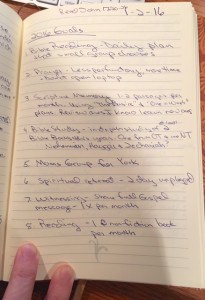
With all the attention recently on the artful Bible journaling, I decided I should call some attention to the traditional, long-standing practice of spiritual journaling.
What is “spiritual journaling?”
Basically, journaling is a way to keep a written, permanent account of your spiritual growth and journey. In his book “Spiritual Disciplines for the Christian Life,” author Donald Whitney defines and describes journaling:
As a Christian, your journal is a place to record the works and ways of God in your life. Your journal also can include an account of daily events, a diary of personal relationships, a notebook of insights into Scripture, and a list of prayer requests. It is where spontaneous devotional thoughts or lengthy theological musings can be preserved. A journal is one of the best places for charting your progress in the other Spiritual Disciplines and for holding yourself accountable to your goals.”
Why do I journal?
I’ve been journaling for years. I’ve used binders with loose-leaf paper, spiral notebooks, and beautiful bound journals. And I know some people use electronic journals. The physical journal doesn’t matter so pick the one that works for you. The important thing is the process of journaling. I don’t always do it daily, but I do it regularly. Here are a few of the benefits of journaling I have experienced:
- Fosters spiritual growth by helping me stay purposeful
- Aids in overall spiritual self-discipline
- Helps maintain concentration and focus during Bible reading, meditation, and prayer
- Serves as a permanent reminder of God’s activity and faithfulness in your life
How do I journal?
So, what do I write in my journal? What is important to record? I don’t have a set formula, formal plan, or strict guidelines. I journal during my daily quiet time and always keep my current journal with my Bible and leave it open as I pray and read. What I journal tends to vary from day to day. It depends on what God is teaching me and what is happening in my life at the moment. However the following categories pretty much cover the various ways I journal:
- Write your prayers to God and keep track of His answers
- Record and monitor your spiritual goals
- Express your deepest feelings to God and seek His help to process your thoughts and emotions
- Write down what God teaches you through His Word (Check out the PROBE method of meditating on a Bible passage.)
- Write about your life circumstances or recent events
The goal of journaling is to allow God to use it for your spiritual growth and His glory. As you journal, God can help you process things and see them as He sees them. He will begin to align your attitudes and feelings with His. He can give you direction in how to respond.
Will you give journaling a try? Just grab some paper and start writing? I’d love to hear more about your experience, concerns, or insight with journaling.
Helpful articles and posts on spiritual journaling:
- http://devotional.upperroom.org/lent2013/journal
- “Start the Spiritual Habit of Journaling” by Rick Warren
- Journaling as a Spiritual Discipline by Ann Voskamp
- Creating a Spiritual Journal for Bible Study by Christine Abraham, Women’s Bible Café
Two helpful posts by Rachel Wojo on Bible Journaling for my right-brain readers:




Titus Bible Study
Join Kathy's mailing list to receive a free mini Bible study on the book of Titus.
Success! Check your inbox for the download link.